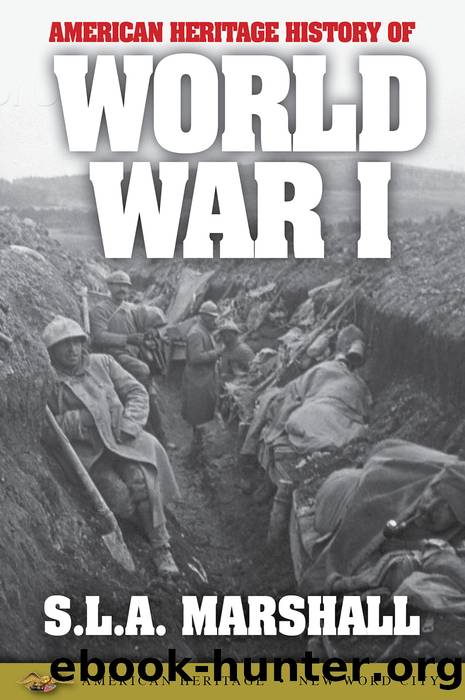American Heritage History of World War I by S. L. A. Marshall

Author:S. L. A. Marshall [S.L.A. Marshall]
Language: eng
Format: epub
Tags: History/Military/World War I
ISBN: 9781612308067
Publisher: New Word City, Inc.
Published: 2014-08-25T00:00:00+00:00
Conscription in Britain
As Germany girded for Operation Gericht, Great Britain at last faced up to the universal service issue.
By January 1916, approximately 1 million British males had entered war service voluntarily, and approximately 400,000 had been lost in battle. To fill the gaps, some 5,000 volunteers were needed every week. But in addition to the losses in action, there was another drain. The Armed Forces were still operating under peacetime law. Regulars had not been frozen in their jobs; when their terms of enlistment expired, they were free to return to civilian life. Throughout the summer of 1916, an average of 5,000 NCOs and privates bailed out of the army each month. The figures on intake made it clear that either the nation would adopt conscription or the BEF ultimately would be eliminated by death and wounds.
Prior to the forming of the coalition government in May 1915, the Tories had spoken somewhat halfheartedly for conscription, but had let the question die. Lloyd George was its most vocal champion, though his Liberal Party was against it. Other ministers, believing that it was Kitchenerâs duty to take the lead, stayed circumspectly silent. The field marshal maintained a sphinxlike silence, reiterating that he would need seventy British divisions in the field to implement the great design for 1916, without ever suggesting how they might be raised.
Asquithâs pressure on Kitchener was responsible for the latterâs failure to take a stand. Kitchener was in his debt politically and Asquith knew how to stake a claim on loyalty. He abhorred conscription, mainly because Lloyd George wanted it, and he also feared that he might lose office over the issue. So Kitchener stayed aloof while Asquith went ahead with a hair-brained idea called the Derby Scheme, which was supposed to forestall the need for conscription. Its farcical results led to the draft.
Lord Derby was director general of recruiting. To keep voluntary service alive, he proposed all males of fighting age should register and certify their willingness to serve if called. Married men would not be called until the supply of bachelors was exhausted.
So on the appointed hour, hundreds of thousands of married men visited the booths to attest their patriotism, confident that they would not be called. But a million able-bodied bachelors remained at home; governmentâs hot breath was too close to their necks. These reactions ruined the Derby Scheme.
The debate on conscription in the House of Commons was unexpectedly short, and after the second reading on January 12, the measure was passed 533 to forty-one. The act also received widespread popular approval and press support. One feature of the bill added a new term to the English language. Alternatives to frontline duty were provided for persons classed as âConscientious Objectors.â One London newspaper gave it a banner headline: âNew Name for Slackers - Conscientious Objectors.â
There were too many loopholes in Britainâs first draft act; there had been too little honest surveillance of the manpower requirement. Asquith saw to it that the Military Service Act that passed in January exempted all married men and single men who could claim dependents.
Download
This site does not store any files on its server. We only index and link to content provided by other sites. Please contact the content providers to delete copyright contents if any and email us, we'll remove relevant links or contents immediately.
| Civil Rights | Discrimination |
| General | Human Rights |
Day by Elie Wiesel(2786)
The Age of Genius by A. C. Grayling(2592)
Gideon's Spies: The Secret History of the Mossad by Gordon Thomas(2355)
The Gulag Archipelago (Vintage Classics) by Aleksandr Solzhenitsyn(2106)
FATWA: Hunted in America by Pamela Geller(2013)
Columbine by Dave Cullen(1870)
Men Explain Things to Me by Rebecca Solnit(1729)
The Rule of Law by Bingham Tom(1701)
Anatomy of Injustice by Raymond Bonner(1671)
Examples & Explanations: Administrative Law by William F. Funk & Richard H. Seamon(1649)
Three Cups of Tea by Greg Mortenson(1620)
The Source by James A. Michener(1618)
That Every Man Be Armed by Stephen P. Halbrook(1584)
ADHD on Trial by Michael Gordon(1581)
Future Design by Unknown(1580)
Gideon's Spies by Gordon Thomas(1512)
Palestinian Walks by Raja Shehadeh(1499)
Constitutional Theory by Carl Schmitt(1458)
Nothing to Envy by Barbara Demick(1451)
